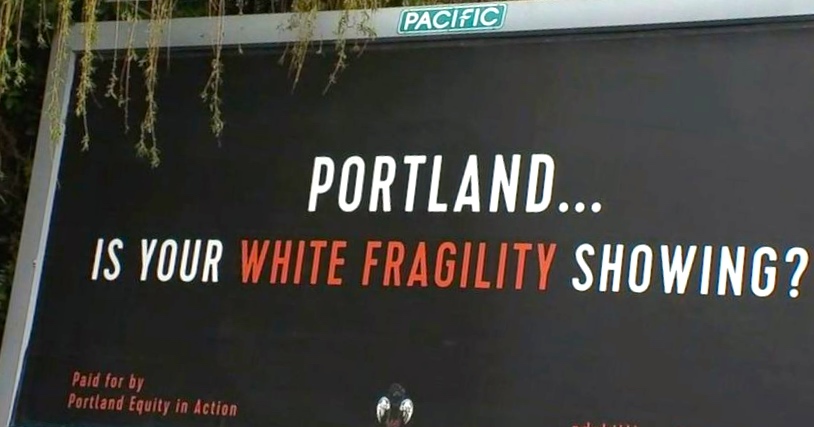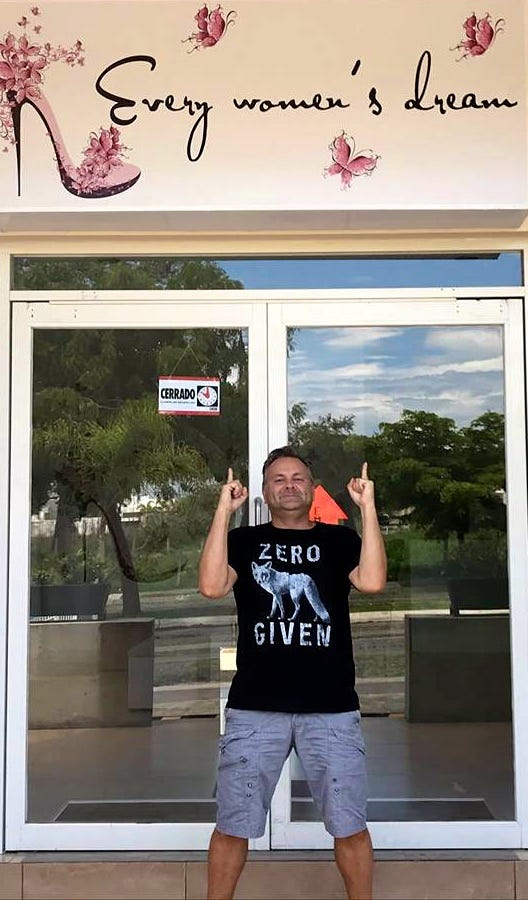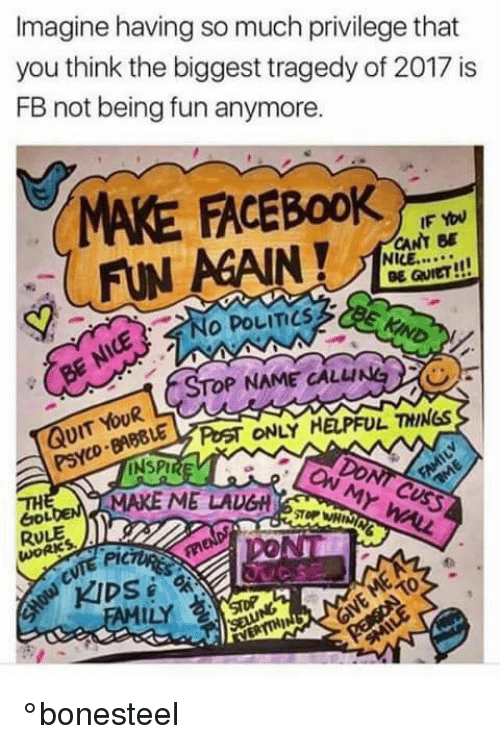7 White Privileges I Didn’t Realize I Was Enjoying

When white people hear the words privilege or privileged they almost always react negatively to the implication that they have not earned what they have or where they are in life.
In a highly meritocratic society ‘privileged’ can only be taken as an insult meaning that you didn’t work hard. That you’re spoiled. Yet we have no objection to the term “underprivileged”. We use it with great charity and frequency. This doesn’t bother us because it implies that we are the charitable ones doing the helping, (see: white savior complex, White Man’s Burden, Humanitarians of Tinder, voluntourism) and it does not imply that we are overprivileged.
Most white people will immediately do the same four things I did the first time someone implied that I was privileged, likely in the exact same order. This is a replicable social experiment. (And you don’t have to be a person of color to get the following reactions from white people. We’ll react the same way to other white people, just with less trepidation and more indignation.)
- They will balk. They will probably put their hand on their chest and stammer, flabbergasted. If they don’t say Meee?! out loud their face will.
- They will defensively launch on an impassioned speech detailing how hard they’ve personally worked and list a few key sacrifices they feel they’ve made that got them to where they are today.
- Then they will explain how much harder their parent(s) struggled just to make ends meet.
- Finally, they will call upon the Potato Famine/Great War/Great Depression/Dust Bowl/WWII experiences their grandparents and great-grandparents survived. We will list how many family members were poor farmers or persecuted immigrants (from any European country besides England).
But here’s the reality. For privileged white people, “privilege” always means anyone wealthier than we are. Regardless of our own education, opportunities, or income level, we all see ourselves as neutral, as the default setting. Anyone poorer than us is underprivileged and anyone richer is privileged. The word never actually applies to ourselves. It’s a moving target.
As much as we instinctively recoil at being called privileged, being accused of having white privilege specifically is like dumping gasoline on a grease fire. We cannot abide. We especially balk because we’re afraid it proves every “good” white liberal’s worst fear — that we’re racist. It doesn’t.
Robin DiAngelo, author of White Fragility, explained a dichotomy I didn’t know I was struggling with:
“The good/bad binary is the root of virtually all white defensiveness.”
That is to say, you can be privileged, you can even have white privilege, without being a bad person. You can be a good person who happens to be benefitting from some systemic privilege that simultaneously disadvantages other people. That doesn’t make you “bad” — not lazy, stupid or spoiled. And it doesn’t make you racist.
So with that lengthy preamble behind us, let’s go to Colima, Mexico, where my friend Steve Mellross burst a bubble I didn’t realize I’d been living in.
“I have the privilege of being casual,” he said. “All the time.”
And one realization after another tumbled in front of me. So, courtesy of my friend Steve’s prompt, here are the seven privileges I am now aware that I’ve been enjoying. I am certain there are more that I am still not aware of because, drum roll, that is how privilege works.

1.) Of Dressing Casual*
White people get to dress casually and still be treated respectfully. In many societies and social circles people are treated based on how they look. Classism is alive and well. And in societies where colorism runs parallel with classism, white can be perceived as synonymous with wealthy. We do not have to iron button-up shirts or tuck anything into our pressed flat-front slacks or shine our shoes in order to be acknowledged or enjoy good customer service. We can wear cargo shorts and flip flops and awesome t-shirts. You can’t see Steve’s feet in this picture but I’m willing to bet he’s wearing flip flops. The privilege of being casual is immediately recognizable in white expats living in tropical countries. They like Hawaiian shirts or ironic t-shirts, rafting sandals and those moisture-wicking REI pants that unzip into shorts in case an unexpected recreation emergency/opportunity arises and you don’t have time to go home and change clothes.
I can walk around dressed like an overgrown college kid with a messy man-bun, wrinkled clothes and without makeup and no one looks at me like I don’t have a right to be wherever I am — the grocery store, church, Costco, Sunday brunch at Sanborn’s — it doesn’t matter. And I’m willing to bet it’s because I’m white. And no matter where we go when we’re casually dressed we’re never side-eyed as staff tries to discern whether or not we can pay the bill.

2.) Of Opting Out
When your newsfeed is too overwhelmingly depressing and you need to cleanse the tarnished palate of your soul, you can: not watch tv, not read the news, log off facebook, or not talk politics. You can take a break from the danger and violence and fear and hopelessness, the starving Yemeni children, gang rape as a weapon of war in the DRC, ISIS sex slaves and the worldwide rise of white nationalism.
Some people take to social media to beg cops to stop killing unarmed people in their community. Other people just want to post their awesome travel photos, brag about their boring kids and watch cat videos. But imagine hoping that raising awareness on social media just might reduce your risk of being gunned down by a law enforcement officer.Facebook and Instagram can be very different places for different people.
One of the things this privileged white girl is learning from the Black Lives Matter movement is that there are POC that live with fear and danger and hopelessness every. single. day. They live with a chronic hypervigilance that they don’t get to take a break from, that I can only assume is mentally exhausting, emotionally draining and physically frustrating when it’s not terrifying. I will keep this section brief because the other thing I’m learning is the importance of listening. We don’t need to take up space paraphrasing what marginalized communities can better say for themselves.
3.) Of Self-identifying as an Expat;
Not being called an immigrant or an Illegal
Many Americans and Canadians head south for vacation, relocation or retirement. And not all of them do it legally. These snowbirds form communities of varying degrees of insularity and multilingualism. They have blogs, newsletters, tax shelters, housekeepers and second homes. But what they do not have is the stigma of being called an immigrant.
The connotative definitions of “expat” vary but they are all largely devoid of fear and xenophobic outrage.
4.) Of Not Being Followed in Stores/Having Your Bags Checked
In the US I regularly use my grocery bags instead of carts when I’m only picking up a few things. And no security guard has ever stopped me as I’m walking in and made me check any “large or oversized bag” at the counter. Not once in my entire life have I ever been stopped, questioned, arrested or attacked for putting unpurchased items in my own bag while I walk the aisles and grab what I need. When I put my large or oversized bag on the conveyor belt no cashier has ever said anything to me or lectured me. They just scan my items, ring it all up and put it back in the bag. Have a nice day!
5.) Of Not Talking “Politics”
Those not affected by sexual harassment or assault, police brutality, contaminated water, those not dispossessed of their land or seeking asylum have the privilege of being “polite” and not talking “politics”. The world’s dangers are just topics or charitable causes needing donations. And these topics are not considered polite conversation in many circles and circumstances. But for far too many people, these are not merely impolite political topics, they’re their life — real and daily. These “topics” are the quantifiable reality of their lived experience. For those of us who do not have to be hypervigilant in order to survive, these topics have less urgency. They’re more academic, theoretical even, and if it is deemed polite in a given scenario they can be discussed the way any topic would in debate club or chatted about over coffee.
The freedom to opt out of “talking about politics” allows us to avoid mild discomfort at family dinners or awkward conversations with friends or coworkers. Privilege means the ability to compartmentalize and label some things as “political” topics instead of everyday phenomena that affect your life, your livelihood and your community.
It is part of good (white) etiquette at holiday parties, most social gatherings and all family reunions to avoid most of these topics. This is not to say that some errant family member won’t breach that etiquette from one end of the political bell curve or another. But be they far-left or far-right they are typically considered a nuisance the rest of the family is embarrassed by.

6.) Of Not Being Held Accountable for Others in Your Community
I wish I could remember where I read this or who said that white privilege is not having to explain Paris Hilton’s sex tapes or behavior. And most certainly not being assumed to be like her.
She might be representative of spoiled American heiresses but no one watched her jet-set debauchery and turned to their white friend and said why are you all like that?
But if a Black guy robs a convenience store too many white people have assumed that it is proof of the inherent criminality of All Black People.
And then the school shooting epidemic came to pass. And the over-trotted ‘lone wolf’ explanation exonerated all white people, and more specifically all other enraged white men and boys, from having to explain the motives and actions of individuals they’d never met and know nothing about. This is despite the alarming number of similarities among the ‘lone wolf’ school shooters. But Black people are expected to explain with accessible insight and compassionate patience everything from Colin Kaepernick’s “disrespectful” kneeling to Kanye’s strange and impetuous bromance with Donald Trump.
7.) Of Not Being Pigeonholed
I don’t know how many Latinas have been asked to call some popped-collar douchebag Papi just so he could feel a quick unearned thrill. But I saw it once and was physically repulsed. And I was certain that same white bruh would never ask a random white girl to call him daddy. (Actually, he probably would, racism and sexism being not uncommon bedfellows.) Asking a stranger to do something performatively sexual and intimate is obviously inappropriate and almost always creepy. But it’s not the only way to pigeonhole people.
White people will even admonish POC for not “embracing their culture”, which is just another form of pigeonholing. The Food Network, for example, seems to expect “ethnic” food from their “ethnic” hosts and contestants. White people, however, are free to pursue whatever culinary influence and path they’re passionate about. They are not accused of being ashamed of their culture or abandoning their roots.
Unfortunately, there is no shortage of examples of ways that we pigeonhole ethnic and cultural groups with stereotypes — including positive stereotypes like Asians being good at math or Black guys being well endowed.
But the only thing anyone seems to assume that I am as a white person is “neutral” and non-threatening, possibly well-off.
Take the following academia as a cautionary tale from Shamus Khan, the chair of the sociology department at Columbia University, and author of Privilege: The Making of an Adolescent Elite at St. Paul’s School.
“The classical root of ‘privilege,’ privus lex, means ‘private law.’ The French aristocracy, for instance, was endowed with privileges, primarily exemption from taxation. Today’s equivalents are not aristocrats, yet they have both the sense and the experience that the rules don’t really apply to them and that they can act without much concern for the consequences.”
Stated more simply: Don’t act like an entitled asshole no matter who you are, what you have or what obstacles your grandparents overcame when they got to this country.
Khan continues: ” … privilege casts inherited advantages as “exceptional” qualities that justify special treatment.”
And so, my white friends, this is why it matters and reasons you should try to be diligently self-aware, to learn what you might be taking for granted.
While Khan is specifically talking about the elite educational privileges of American “aristocracy” that circumvent actual meritocratic processes and install the elite class in the highest offices in the land, remember that Average Joes can still be dicks. That those in these elite positions of power feel free to disregard the rules as they are made for the common man, not themselves, they feel they can flout both rules and consequences.
Don’t be that white person. At home, wherever you call home, or abroad. Don’t flout the rules. Learn them. Follow them. And if you don’t, accept the consequences with grace and respect.
*Update: Friends in Monterrey, Mexico read this and pointed out that there is a major distinction between urban and rural communities here. And there is no business casual exemption clause for white people who work in offices. But it is my current perception that most white expats do not have Mexican jobs. If they are still working and not living off their pensions they typically have the ability to work online or manage their business long-distance. This is not to say that they don’t dress occasion-appropriate for weddings or concerts or any event with an implied dress code. But with few exceptions they don’t seem to have to dress “nicely” to be treated with respect in banks, airports, churches, restaurants, etc.